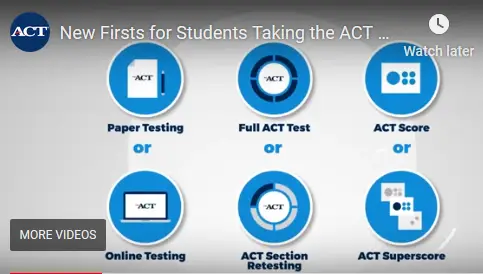ACT ANNOUNCES SECTION ‘DO-OVERS’
Why is the ACT Announcement so important? The ACT and College Board (SAT) companies have been highly competitive with each other over the past decade, making the ACT’s recent announcement revolutionary for this industry. Most important is the ability for students to effectively “Do Over” specific sections of the test at their choosing. For example, if a student has done well in three test sections (ie, English, Math and Reading) but not done as well in Science, they can now retake just the Science section. So what does this mean?

THE ACT ANNOUNCEMENT
There are 3 components of the Announcement:
- Section Retesting
- Superscoring
- Online Testing
Section Retesting – Starting in September 2020, students can focus on one or more sections of the test, rather than having to re-take the entire test.
Superscoring – ACT will now calculate a superscore for the student, making it easier for colleges to determine a student’s “best” score.
Online Testing – This will be an option, but paper testing will still be available. Online test takers will have their scores as early as two business days after their test date. During application season, this can be a huge benefit.
ANALYSIS OF THESE CHANGES
Section Retesting is the most significant change. On the surface, this will benefit students who struggle with one or more sections of the test. They will no longer need to retake sections that were already mastered. Students will get what they have been asking for years—the ability to focus only on those sections where they have fared poorly or not done as well as other sections. But there are likely to be some concerns as this gets rolled out:
- Composite Scores across the country will likely increase, resulting in a more difficult curve for all students.
- It is unclear whether all colleges will accept this retesting change as well as the “superscore.”
- If the College Board were to follow this retesting path, it would be a bit lengthier for the test taker. For example, to retake ACT English will be just 45 minutes and just 35 minutes for ACT Reading. Due to current SAT design, re-setting the Reading and Writing scores for the SAT (should that ever be allowed) would mean re-taking both Reading (65 minutes) AND Writing (35 minutes), for a total of 100 minutes. Similar timing would occur for both math sections, 60 minutes for the ACT versus 80 minutes to take both math sections on the SAT (no calculator and calculator).
Note: Retests will only be offered on national ACT exam dates at “online-equipped” testing centers.
Superscoring is sensible and will save parents money from sending multiple test scores to each school. More importantly, students will not have to stress about retaking sections where their scores are already good. Colleges will be encouraged to accept ACT superscores. Overall, this is a smart move.
Note: If a student chooses to have a superscored report sent to colleges, that report will include information on all the testing events that created the score. Colleges will know whether the superscore came from one sitting, multiple full-test sittings, or section retests.
Online Testing is happening for all standardized testing. The downside is that those students who like to write, underline, etc, will need to adjust. And as with any electronic test taking device, there is the possibility that something may malfunction. The benefit of getting scores sooner is a big plus, though lately scores have been coming through faster than ever.
CONCLUSION:
What looks like a positive and overdue set of changes by the ACT is being driven by market share positioning. The College Board, the long-term industry leader, was surpassed by the ACT around 2010 and just last year regained their title. While benefiting student test takers with their recent announcement, the ACT company is also delivering a marketing blow to their competition. Though the College Board revamped their test in 2015/2016, the ACT has quietly updated some of their test sections. This is the first effort by the ACT in a while to really regain the market of test takers. In the meantime, until the section testing and superscoring changes get digested by the admission process – students, parents, and educators should take advantage of these changes. Just understand that in our rapidly changing world, it may very well result in push back and counteractions. Stay tuned…







